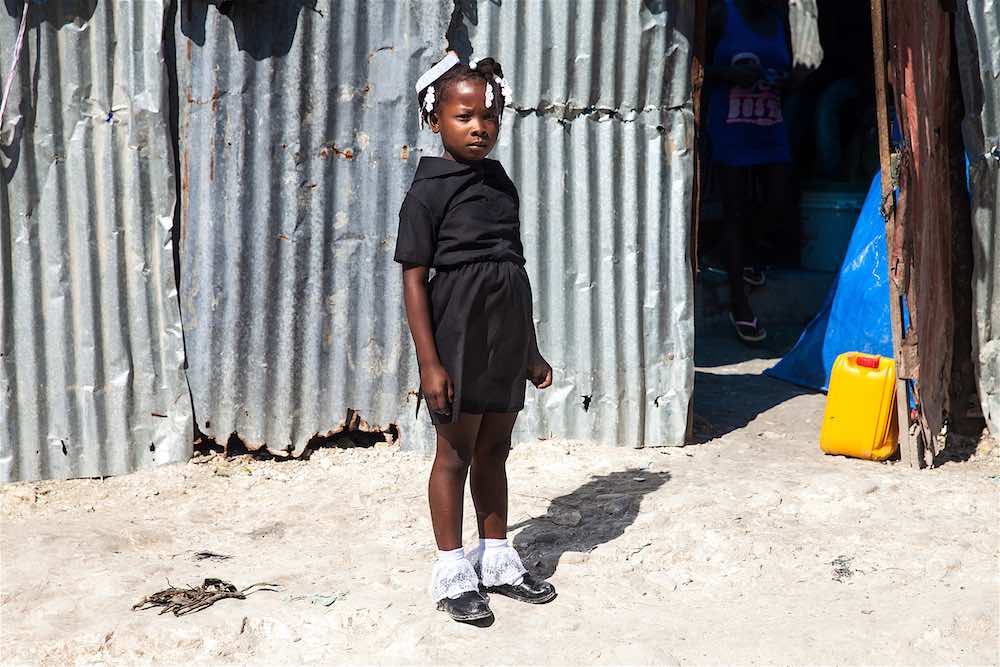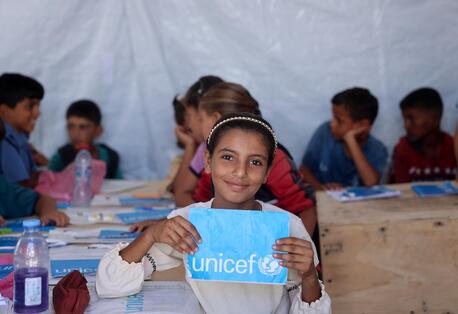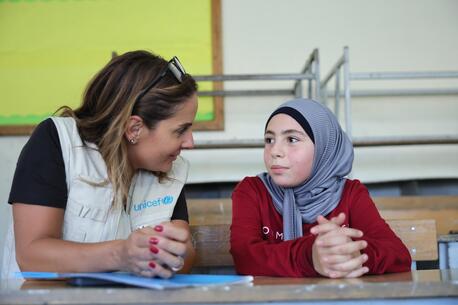
Trying to Heal in Haiti: Loudina's Story
UNICEF USA videographer Michelle Marrion was on vacation in Port-au-Prince, Haiti, when Hurricane Matthew swept across the island, devastating the country's southern coast and claiming nearly 1,000 lives. Two months later, Michelle returned to help document UNICEF Haiti's relief efforts. In Jeremie, she met Loudina, an eight-year-old girl orphaned by the storm.
I have a deep connection to Haiti — it's where my parents were born, and I still have family there. On a personal level, it was so important to me to meet the children affected by the hurricane, to see first hand how they were coping, and how UNICEF was helping. I spent three weeks there in December, traveling by van to Jérémie, one of the hardest hit areas, with guidance from a UNICEF child protection officer. I heard so many heartbreaking stories about families who had lost everything.
An aid worker I met told me about a young man in his 20s. The man had lost his aunt, and now his mother was taking care of the seven young cousins she had left behind. He helped put me in touch. That’s when I met Loudina.
WATCH: Loudina's Story
I went to the house where Loudina was staying, 11 people living under that one roof, including Loudina’s six siblings. Everything was now on the one Auntie’s shoulders.
When I got there, Loudina was hiding, but eventually she came out and started talking to me.
When I got there, Loudina was hiding. Eventually she came out and started talking to me. I wasn’t filming or anything that first day. We were just getting to know each other. It helped that I had a social worker with me. This little girl had been through so much. I wanted to be sure I didn’t ask any questions that could harm her in any way. The aunt agreed that we could meet again, that they could show me where Loudina used to live.
The next day, we found ourselves walking down a long cavernous trail along the side of a ravine, quite a ways off the beaten path. This was not a place where people are supposed to build homes, but they do it anyway. They are so poor. They have few alternatives, so they squat on the land. They do whatever they need to do.
This little girl had been through so much. I wanted to be sure I didn’t ask any questions that could harm her in any way.
At the spot where Loudina’s house once stood, only a pile of rubble remained. There were a lot of other damaged houses nearby. One family had started to rebuild with some two by fours and a sheet of tin. The whole place felt very somber.
Everyone was wearing black. In Haiti, you wear black when you’ve experienced loss. Loudina was wearing black, a simple black dress that somebody had made for her. You see that dress in the video. She is wearing it as she tells her story about the day the storm hit, about her house falling down around her, and how she had to keep yelling for help. When she tells me her mom was gone, she looks down at her feet. "The wind came," she said, "and a house fell on top of her."
At other moments, Loudina was bright and bubbly. She hadn’t been back to her old neighborhood since the storm, and while we were there she saw some of her old friends. They started playing house with little twigs. She looked happy then, in spite of everything.
When she tells me her mom was gone, she looks down at her feet. "The wind came," she said, "and a house fell on top of her."
The social worker and I encouraged Loudina and all her siblings to go to one of the UNICEF-supported child friendly spaces set up after the hurricane. Kids can gather there and play games and sing songs. There are counselors to talk to and give these traumatized kids the support and services they need. One way that UNICEF connects with families who need assistance is at these centers.
Loudina was a little shy when we first arrived. There were so many kids there, kids she didn’t know, and I think she found that a bit overwhelming. Little by little, though, she came out of her shell. I saw her really enjoying herself. I hadn’t seen her Auntie smile until that day. It made me so happy to see.
The kids who come together in these play spaces, they may not know each other but they have a lot in common. They'd all lived through a massive hurricane. So many of them had lost homes and loved ones. They needed this time together.
At other moments, Loudina was bright and bubbly ... when she saw some of her old friends, and they started playing house with little twigs.
While I was in Jérémie, I got the sense that the people there are eager to get back to their routines, to get back to normalcy. The children want to go back to school — as soon as possible. The temporary schools aren't reaching every child yet. I know UNICEF is working to get more kids back to learning, and I think that will make a big difference.

Eight-year-old Haitian girl, Loudina Bien Aimer, 8, orphaned by Hurricane Matthew, on her way to her UNICEF-supported temporary school in Jérémie. "I miss my mom," she says. "She took good care of us." © UNICEF USA/Marrion/2016.
Support UNICEF efforts to help children and families in Haiti recover from Hurricane Matthew.
Recovery continues in the areas devastated by Hurricane Matthew, with UNICEF and partners aiming to reach all 1.1 million children in need with clean water, education, vaccines and treatment for malnutrition. UNICEF continues to distribute learning materials and teaching kits, and provide equipment and other support for school repairs. In January, 35 schools serving 15,000 students reopened with UNICEF's help, with another 50 on track to reopen soon.
HOW TO HELP
There are many ways to make a difference
War, famine, poverty, natural disasters — threats to the world's children keep coming. But UNICEF won't stop working to keep children healthy and safe.
UNICEF works in over 190 countries and territories — more places than any other children's organization. UNICEF has the world's largest humanitarian warehouse and, when disaster strikes, can get supplies almost anywhere within 72 hours. Constantly innovating, always advocating for a better world for children, UNICEF works to ensure that every child can grow up healthy, educated, protected and respected.
Would you like to help give all children the opportunity to reach their full potential? There are many ways to get involved.





